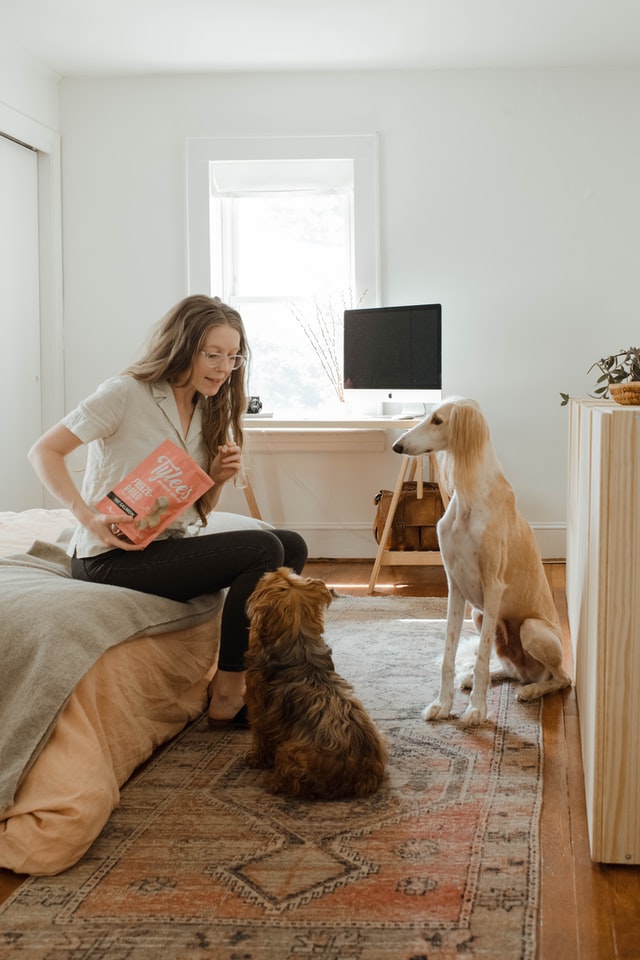
Dog education and training
Share
Scientific research shows that the puppy's character is shaped by the impressions and experiences of the first twelve to fourteen weeks. This period is called the imprinting stage, and having realized at that time that strangers, children, cats and cars do not intend to harm him, the dog treats them appropriately throughout his life. On the other hand, a puppy that has been living with its mother and litter for fourteen weeks, seeing only the feeder, will have a hard time getting used to people. The impressions of that time will have a decisive influence on the little puppy. If a puppy is attacked by a cat during those fourteen weeks, the dog will hate cats for the rest of its life, and it's probably obvious to everyone why.
Of course, it is best to buy a puppy from a breeder who will prove to you that he spared no time and energy in getting the animal used to people. When the puppy is no less than seven and no more than twelve weeks old, you can take it home. Next, you will raise the puppy.
Consistency and logic
A dog should always be trained consistently and logically. For example, you only say "good" to a dog when it has completed a task. It seems obvious, but usually people don't know how to act consistently and logically. If you want to train your dog to lie down, praise him only if he lies down. When leaving the house, people often command the dog: "Lie down". Since it is impossible to check whether the dog has obeyed, it is better not to give such commands.
If you have decided to forbid the dog from lying on the bed, do not allow him to crawl on it, even when the dog is sick. If the dog is sick, put a mattress or mattress on the floor to make him calmer and more comfortable next to you, but do not allow the dog to climb on the bed.
If you don't want your dog to happily jump on other people to greet them, never let him do that, even when you're wearing old clothes. The dog does not understand why it is sometimes allowed to do something and sometimes not, so it gets confused and confused.
Of course, it is difficult to consistently treat a puppy, especially in a large family, where each member has their own opinion on how to best raise a dog. A dog is very unhappy if it does not understand what its owners want from it. Some breeds are so shaken by illogical behavior that the dogs end up becoming extremely aggressive or fearful. Don't let the parents change the rules. Before you bring your puppy home, discuss with family members what will be allowed, what will not, and how important it is to stick to the rules.
Punishment
If the dog has committed a crime, punish it immediately, not after a while. For example, after you left, the dog turned the whole house upside down. When you get home and see that everything is gutted like after a fire, you punish the dog. It is clear to you that the dog is guilty, and you judge from its expression that the dog understands this. Not at all. The dog has long since forgotten his pranks, but he will not forget the punishment and will start to fear you. He will realize only one thing: your return home is associated with punishment, so he will anxiously await what will happen when you enter the room. A dog can become aggressive, irritable or fearful - a different breed. He has lost trust in the leader of the gang - you. If your dog doesn't stay in his fur when you're not home, keep him outside or lock him in a room where he can't cause trouble. Then it will always be "good" when you come back. Most dogs outgrow their desire to destroy, but one animal that lacks exercise or attention continues to terrorize the home. Sometimes he does it out of boredom. For bad deeds, the puppy should be punished immediately. Another example: you call the dog, and it comes after an hour's hesitation. The dog obeyed the command, so it should be praised. Unfortunately, the owner often punishes the dog, because it did not reproduce by brainstorming. Consequently, the dog will learn to associate this command with punishment and will not be in a hurry next time.
Relationships with dogs, other pets and children
A dog's attitude towards other dogs, pets and children is partly determined by manner and breed, partly by imprinting. Dogs not used to living with other living creatures will become confused when confronted with other dogs, pets and children.
The behavior of various breeds of dogs is described in general terms in this book; such a dog is used to people and properly trained. That's why we warn you: no matter how loving and patient the dog is, never leave it unattended with children.
Children must understand that you should not approach the dog when it is lying down or eating. Teach children not to go to the dog, but to call him, so that the animal knows who is the master of the situation.
We advise you to read a book about training and raising a dog. If you do not have training experience, attend puppy training exercises. Do not forget that no two dogs are the same and that not only different dogs, but also dogs of the same breed are different. Make sure the trainer knows your dog's breed characteristics

